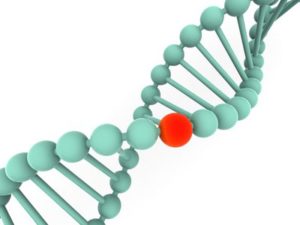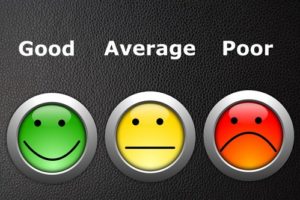None Of Us Are Perfect
Author: Dr. Stephen Chaney
 Most of us think of genetic diseases as something that is very rare. We have learned about diseases like cystic fibrosis or sickle cell disease in school. Those are examples of diseases caused by a rare mutation. If both chromosomes carry the mutation, you have the disease. If not, you don’t.
Most of us think of genetic diseases as something that is very rare. We have learned about diseases like cystic fibrosis or sickle cell disease in school. Those are examples of diseases caused by a rare mutation. If both chromosomes carry the mutation, you have the disease. If not, you don’t.
Can a genetic dna test give you real insight on your health?
We also know that family history is a strong predictor of genetic predisposition. If you are a guy, and most of the males in your family tree have dropped dead of a heart attack at an early age, you can assume you are genetically predisposed to heart disease. If you are a gal and most of the women in your family tree have developed breast cancer at an early age, you can assume you are genetically predisposed to breast cancer.
However, if none of these apply, we assume we are “normal”. We think we’ll probably live to 120. All this healthy lifestyle “stuff” is nice, but it isn’t a priority. It makes me think of Garrison Keillor’s tales of “Lake Wobegon” where all the children were above normal.
What if that weren’t true? What if none of us were normal? What if all of us are predisposed to some disease, perhaps even multiple diseases, and didn’t know it? Would that change how we thought about making the effort to follow a healthy lifestyle?
None Of Us Are Perfect
 On one hand, this study (MacArthur et al, Science, 335: 823 – 828, 2012 ) may seem of interest only to geneticists, but its implications are huge. The authors looked at genetic variation among the human genomes sequenced as part of the human genome project. Specifically, they looked for loss of function (LOF) variants – mutations that would either partially or completely prevent the synthesis of a functional protein.
On one hand, this study (MacArthur et al, Science, 335: 823 – 828, 2012 ) may seem of interest only to geneticists, but its implications are huge. The authors looked at genetic variation among the human genomes sequenced as part of the human genome project. Specifically, they looked for loss of function (LOF) variants – mutations that would either partially or completely prevent the synthesis of a functional protein.
After a very complex genetic analysis they concluded that each of us harbors about ~100 LOF variants (mutations) in our genome.
Some of those mutations were in genes coding for proteins that have no known function. Other mutations coded for proteins whose loss might affect minor things like taste sensation.
Still other mutations were in genes coding for proteins that were redundant because there are other proteins in the cell that can perform the same function (Just as NASA designed the space shuttle with backup systems that could take over if a primary system failed, our bodies are frequently designed with more than one enzyme that can carry out the same function).
And, as you might expect, some of those mutations were in genes associated with known diseases like sickle cell disease or cystic fibrosis – but those mutations were very rare.
However, the authors concluded that each of us harbors about 20 LOF mutations that completely inactivate essential genes and might increase the probability that we will develop certain diseases.
That got me thinking. It validated scientifically something that we have all known instinctively for a long time – none of us are perfect. Or, as my childhood friends might have more cruelly put it: “We’re all defective in one way or another.”
What Does This Mean For You?
Now some of you may be saying: “What does this mean for me?” When you carry this idea through to its ultimate conclusion, the bottom line message is:
1) Nutritional recommendations are based on averages – none of us are average.
2) The identified risk factors for developing diseases are based on averages – none of us are average.
3) Clinical trial results are based on averages – none of us are average.
4) Clinical trials on the benefits and dangers of supplementation are based on averages – none of us are average.
5) Even clinical trials of drug efficacy for treating disease or drug safety are based on averages – none of us are average.
That means lots of the advice you may be getting about your risk of developing disease X, the best way to treat disease X, or the role of supplementation in preventing disease X may be generally true – but it might not be true for you.
So, my advice is not to blindly accept the advice of others about what is right for your body. Learn to listen to your body. Learn what foods work best for you. Learn what exercises just feel right for you. Learn what supplementation does for you.
Don’t ignore your doctor’s recommendations, but don’t be afraid to take on some of the responsibility for your own health. You are a unique individual, and nobody else knows what it is like to be you.
What Can a Genetic DNA Test Tell You About Your Health?
 You may be thinking: “If we know all the loss of function (LOF) mutations that cause disease, I should just send my saliva off to one of those companies that promises to give you a genetic DNA test and advise you of all your disease risks.”
You may be thinking: “If we know all the loss of function (LOF) mutations that cause disease, I should just send my saliva off to one of those companies that promises to give you a genetic DNA test and advise you of all your disease risks.”
Not so fast. It isn’t that simple. Here’s what those genetic testing companies aren’t telling you.
- Genetic predisposition to most diseases is caused by multiple mutations that each make small contributions to your disease risk. There are only a few LOF mutations that dramatically increase your risk of major diseases like cancer, heart disease, and diabetes. Unless you have one of those rare mutations, you are in the dark about your disease risk.
- LOF mutations are just the tip of the iceberg. There are many more mutations that affect regulation of metabolic pathways which impact your health. Many of these mutations are poorly defined at present. You might get a perfect score on your genetic testing and still be at risk for some major diseases.
- The effect of LOF mutations on health outcomes varies from person to person. This is a phenomenon that my geneticist colleagues call “penetrance”. Simply put, the effect of any single mutation is modified by the expression of multiple other genes, which also vary from person to person. Your “score” on a genetic testing analysis may not predict your actual risk of disease.
- Gene expression is modified by diet, lifestyle, and your environment. I have discussed this in previous articles like “Can Diet Alter Your Genetic Destiny?” and “What Is Epigenetics?”. In short, genes do not determine your destiny. Your healthy lifestyle may protect you from a genetic predisposition to disease. Your unhealthy lifestyle may doom you to poor health in spite of a perfect score on your genetic testing analysis.
I only recommend genetic testing if you have a strong family history of a major disease and plan on working with a certified genetic counselor who can put the results of the analysis into the proper context.
The Bottom Line
- A recent study looked at genetic variation among the human genomes sequenced as part of the human genome project. Specifically, the authors looked for loss of function (LOF) variants – mutations that would either partially or completely prevent the synthesis of a functional protein.
- After a very sophisticated statistical analysis, the authors concluded that each of us harbors about 20 LOF mutations that completely inactivate essential genes and might increase the probability that we will develop certain diseases.
- That means none of us are perfect. None of us are “average”. We all have genetic defects that predispose us to certain diseases. The implications are staggering.
- Nutritional recommendations are based on averages – none of us are average.
- The identified risk factors for developing diseases are based on averages – none of us are average
- Clinical trial results are based on averages – none of us are average.
- Clinical trials on the benefits and dangers of supplementation are based on averages – none of us are average.
- Even clinical trials of drug efficacy for treating disease or drug safety are based on averages – none of us are average.
- That means lots of the advice you may be getting about your risk of developing disease X, the best way to treat disease X, or the role of supplementation in preventing disease X may be generally true – but it might not be true for you.
- So, my advice is not to blindly accept the advice of others about what is right for your body. Learn to listen to your body. Learn what foods work best for you. Learn what exercises just feel right for you. Learn what supplementation does for you.
I am not saying we know everything we need to know about genetic predisposition to disease. I’m not saying that genes determine our destiny. I’m not recommending you send off your saliva for a genetic analysis to determine your risk of developing a major disease. To understand why, read the article above.
These statements have not been evaluated by the Food and Drug Administration. This information is not intended to diagnose, treat, cure or prevent any disease.
